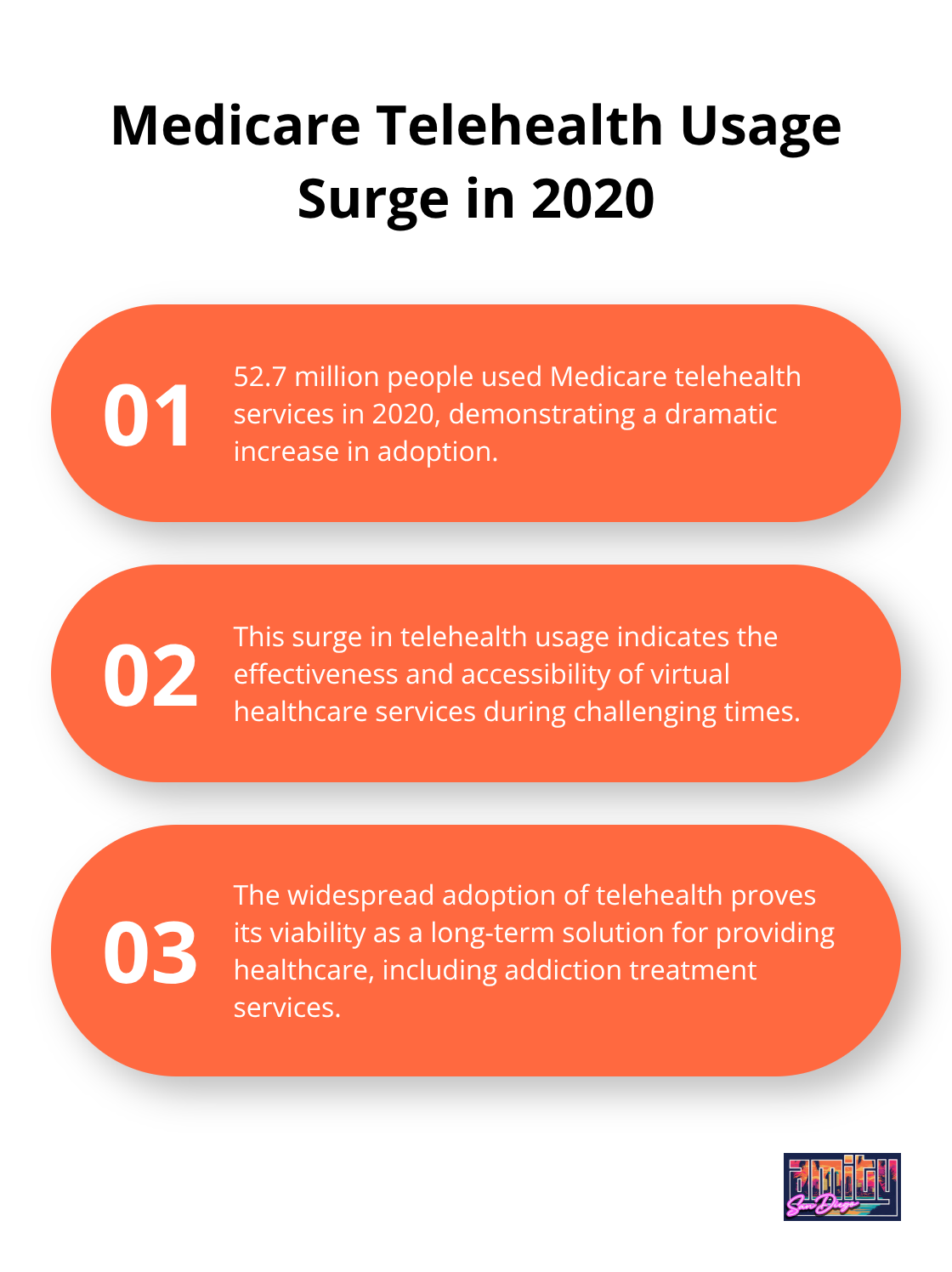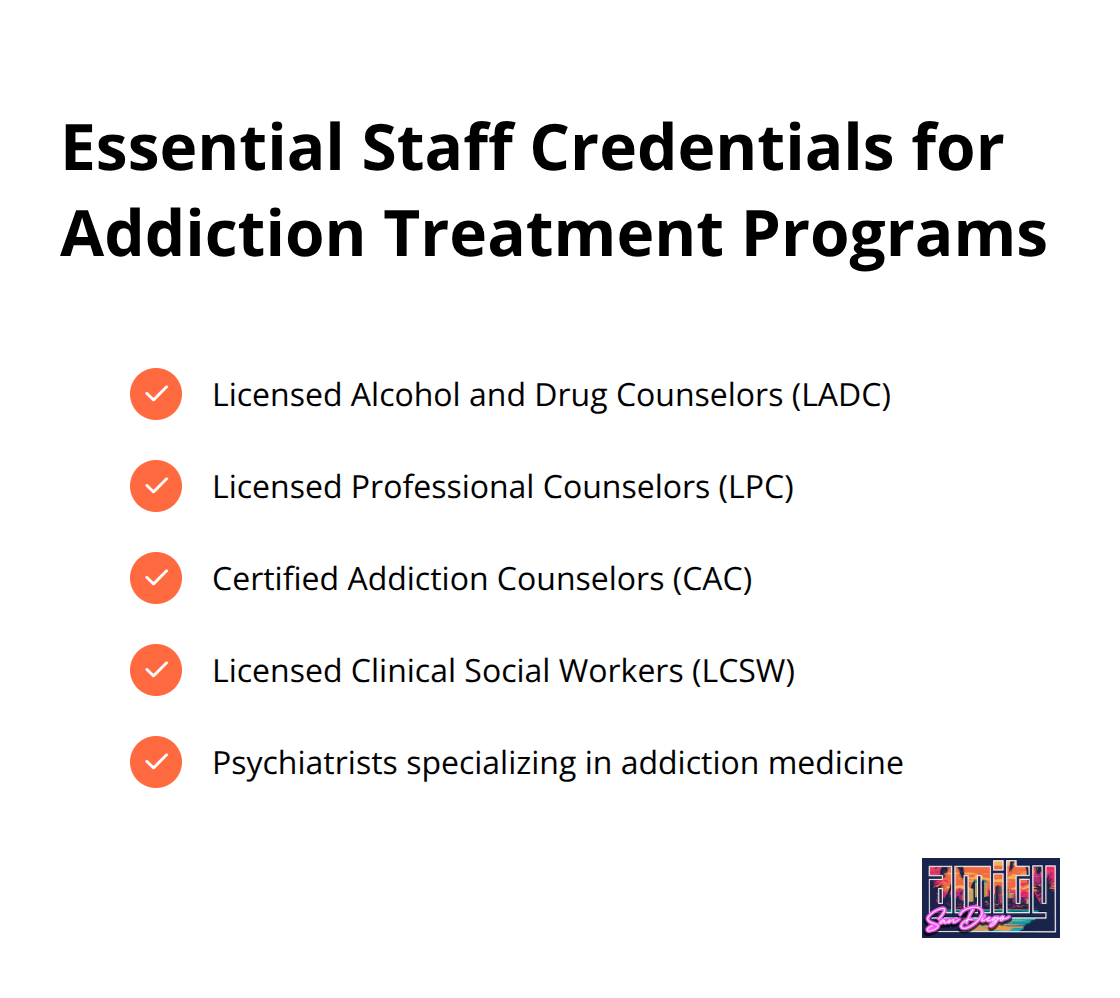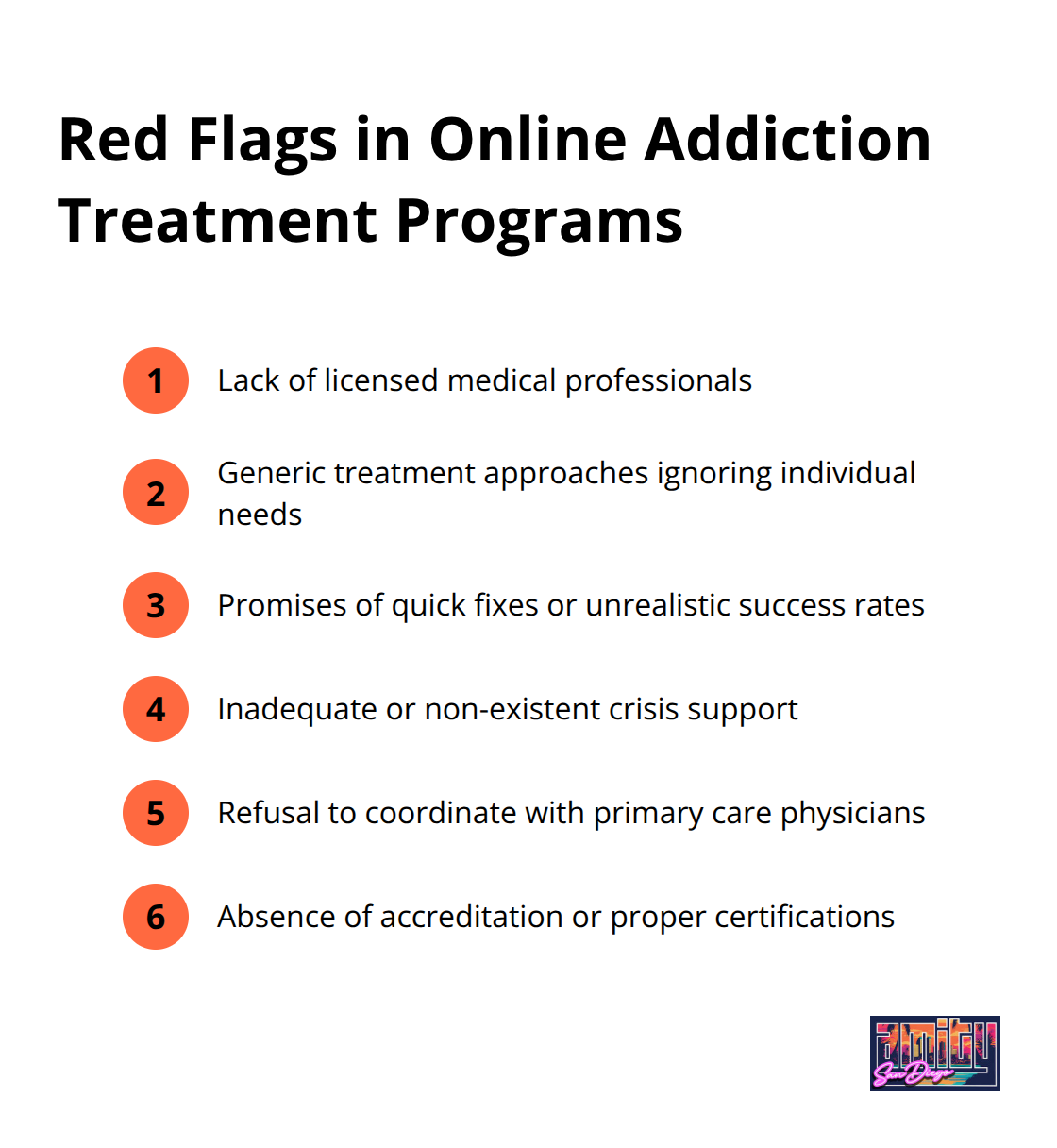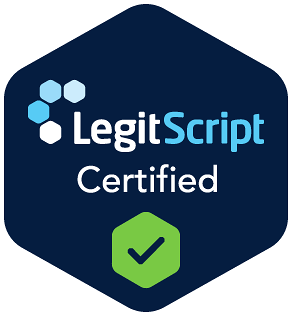Online addiction treatment programs have transformed how people access recovery support, offering flexible alternatives to traditional in-person care. With over 46 million Americans struggling with substance use disorders according to SAMHSA’s 2021 data, digital treatment options provide vital accessibility.
We at Amity San Diego understand that choosing the right program requires careful evaluation of multiple factors to match your specific recovery needs.
What Online Treatment Options Work Best
Telehealth Therapy Sessions That Deliver Results
Telehealth therapy sessions form the foundation of effective online addiction treatment, with research showing that virtual and in-person outpatient treatment options are both effective for substance use disorders. These one-on-one video sessions with licensed therapists deliver the same therapeutic relationship quality as face-to-face meetings while they eliminate transportation barriers and scheduling conflicts.
Medicare data reveals telehealth visits increased dramatically, with 52.7 million people using Medicare telehealth services in 2020, which proves this model works effectively.

Programs that offer Cognitive Behavioral Therapy and Motivational Interviewing produce clinically significant results for alcohol use disorder (according to research published in Addiction journal).
Digital Communities That Actually Help
Monument excels in alcohol addiction treatment because it combines individualized medication management with group therapy sessions. Talkspace offers messaging and live sessions, with 75% of users who report good value according to their April 2022 survey. Programs that promise 24/7 chat support without qualified staff oversight should raise red flags.
The most effective platforms limit weekly sessions to prevent patient overwhelm while they maintain consistent therapeutic contact. Quality programs focus on structured interaction rather than unlimited access that lacks professional guidance.
Self-Paced Programs With Professional Oversight
Mobile applications work best when professionals supervise them rather than when they operate as standalone solutions. Computer-based CBT demonstrates effectiveness in alcohol use reduction according to studies in Alcoholism: Clinical and Experimental Research. Apps that provide worksheets, journals, and progress tracking between therapy sessions offer the most value.
Programs like Online-Therapy.com achieve higher completion rates because they combine unlimited messaging with scheduled sessions. The 91% smartphone ownership rate among U.S. adults makes mobile-friendly programs highly accessible, but apps that claim miraculous results without clinical backing should be avoided.
These treatment modalities work best when they complement each other rather than compete, which leads us to examine the specific factors that separate effective programs from ineffective ones.
What Makes a Program Worth Your Investment
Licensed professionals and accreditation form the bedrock of effective online addiction treatment, yet many programs operate without proper credentials. The Joint Commission and CARF accreditation standards indicate adherence to industry performance benchmarks, while LegitScript certification protects consumers from fraudulent services.
Staff Credentials That Matter
Staff credentials determine treatment quality and legal compliance. Look for Licensed Alcohol and Drug Counselors, Licensed Professional Counselors, and Certified Addiction Counselors who can legally provide clinical care. Programs without these qualifications cannot deliver the medical supervision necessary for safe recovery. Licensed professionals bring specialized training in addiction medicine and evidence-based therapies that unlicensed staff cannot provide.

Insurance Coverage Changes Everything
Insurance acceptance dramatically impacts treatment accessibility and quality. Most major insurers now cover telehealth addiction services, with Medicare processing 52.7 million telehealth visits in 2020 (according to the U.S. Department of Health and Human Services). In-network providers must meet insurance quality standards, which serves as an additional screening mechanism for program legitimacy.
Private pay options should offer transparent pricing without hidden fees. Legitimate programs will verify your insurance benefits before treatment begins. Avoid programs that demand full payment upfront or refuse to work with insurance providers.
Program Structure That Works
Treatment scheduling requirements reveal program philosophy and effectiveness potential. Research shows that consistent, structured sessions produce better outcomes than unlimited access without professional guidance. Weekly session limits prevent patient overwhelm while maintaining therapeutic momentum (with studies indicating that telehealth addiction programs can be effective when properly structured).
Quality programs accommodate work schedules and family responsibilities while maintaining clinical integrity through scheduled appointments. Programs that offer on-demand crisis management without comprehensive care structure often fail to deliver lasting recovery results, which makes recognizing warning signs of ineffective programs essential for your treatment success. Extended treatment programs demonstrate higher success rates through comprehensive care approaches.
Red Flags That Signal Program Failure
Ineffective online addiction treatment programs display predictable warning signs that waste time, money, and recovery potential. Programs without licensed medical professionals cannot provide medication management, withdrawal monitoring, or crisis intervention when patients need immediate help. The National Institute on Drug Abuse recognizes that medications like naltrexone and disulfiram are used in addiction treatment, though disulfiram does not function as an anti-craving drug and does not modulate the neurobiological mechanism of addiction.
Programs That Ignore Individual Recovery Needs
Generic treatment approaches fail because addiction affects each person differently based on trauma history, mental health conditions, and substance use patterns. Programs that claim universal success rates or offer identical treatment plans ignore the American Society of Addiction Medicine’s focus on developing treatment guidelines for substance use disorders. Effective programs conduct comprehensive assessments and modify treatment based on progress, while ineffective ones push everyone through the same modules regardless of individual needs.
Programs that promise quick fixes or claim success rates without peer-reviewed research backing their methods should raise immediate concerns. These platforms often use testimonials instead of clinical data to support their effectiveness claims.
Crisis Support That Disappears When Needed
Programs that advertise 24/7 support often provide chatbots or untrained staff instead of qualified crisis intervention specialists. During withdrawal, relapse episodes, or mental health emergencies, patients need immediate access to licensed professionals who can assess safety and coordinate emergency care. Programs that limit crisis support to business hours or refer patients to generic helplines demonstrate inadequate safety planning.

Quality programs maintain relationships with local emergency services and provide clear escalation protocols for dangerous situations (while ineffective programs leave patients vulnerable during critical moments). Some platforms claim round-the-clock availability but actually route emergency calls to answering services that cannot provide clinical intervention.
Programs That Avoid Medical Integration
Online programs that refuse to coordinate with primary care physicians or psychiatrists create dangerous treatment gaps. Addiction often requires medication management for withdrawal symptoms, co-occurring mental health conditions, and medication-assisted treatment protocols. Programs that operate in isolation from medical care cannot address the full spectrum of addiction treatment needs and may actually interfere with existing medical treatments.
Final Thoughts
Effective online addiction treatment programs transform recovery outcomes through professional guidance and evidence-based care. Quality programs combine licensed therapists, structured schedules, and comprehensive support systems that address individual needs rather than generic approaches. Professional oversight remains non-negotiable in recovery decisions.
Programs without qualified medical supervision, crisis intervention capabilities, or accreditation standards create dangerous gaps in care that can derail progress and compromise safety. Online addiction treatment programs should complement professional treatment rather than replace comprehensive care. Programs that integrate with medical providers, offer crisis support, and maintain clinical integrity provide the foundation for sustainable recovery success.
We at Amity San Diego provide comprehensive outpatient addiction treatment with personalized PHP and IOP programs designed for lasting recovery (our licensed clinical team combines evidence-based therapies with holistic approaches in a supportive San Diego environment). The right program matches your specific recovery needs with qualified professionals who understand addiction medicine. Your recovery deserves programs that prioritize safety, effectiveness, and long-term success over convenience alone.



